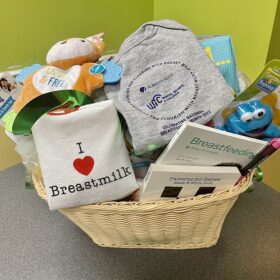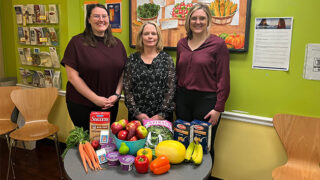WIC - Women, Infants & Children
What is WIC?
The Women, Infants, and Children (WIC) Program provides access to healthy foods for growth and development and promotes food nutrition through education.
WIC benefits for food are provided free of charge to pregnant, postpartum, or nursing women, and for infants and children under the age of 5 who demonstrate a need as determined by WIC guidelines.
The WIC office is open Monday through Friday, 8:30 a.m. to 4:30 p.m.
It's located at 220 Green St. Albany, NY 12202.
To speak with someone in the WIC office, call 518-432-4033.

WIC benefits make it easier for you to shop for healthy food, and can be used at participating grocery stores and farmers markets within New York State.
The WIC benefits cover foods including:
- Baby Food
- Brown Rice
- Canned Fish
- Cereal
- Cheese
- Dried or Canned Beans/Peas
- Eggs
- Fruit Juice
- Fruits and Vegetables
- Infant Formula
- Milk
- Peanut Butter
- Tofu
- Tortillas
- Whole Grain Bread
- Whole Wheat Pasta
- Yogurt
Due to the formula shortage, the NYS WIC formulary has alternate options for a limited time. Depending on the formula you receive, you may be able to temporarily purchase a combination of formula brands and alternate container sizes. If you can't find your assigned formula in the stores, the following resources are available:
See a list of WIC-approved baby formulas in New York State.
Learn more about foods and formula from New York State's WIC Vendors.
Please review the household size and income per pay periods to help determine if you're eligible for WIC benefits:
Effective 2023 - 2024
Pregnant individuals count as two people
One person household:
Annual: $26,973
Monthly: $2,248
Twice-monthly: $1,124
Bi-weekly: $1,038
Weekly: $519
Two person household:
Annual: $36,482
Monthly: $3,041
Twice-monthly: $1,521
Bi-weekly: $1,404
Weekly: $702
Three person household:
Annual: $45,991
Monthly: $3,833
Twice-monthly: $1,917
Bi-weekly: $1,769
Weekly: $885
Four person household:
Annual: $55,500
Monthly: $4,625
Twice-monthly: $2,313
Bi-weekly: $2,135
Weekly: $1,068
Five person household:
Annual: $65,009
Monthly: $5,418
Twice-monthly: $2,709
Bi-weekly: $2,501
Weekly: $1,251
Six person household:
Annual: $74,518
Monthly: $6,210
Twice-monthly: $3,105
Bi-weekly: $2,867
Weekly: $1,434
Seven person household:
Annual: $84,027
Monthly: $7,003
Twice-monthly: $3,502
Bi-weekly: $3,232
Weekly: $1,616
Eight person household:
Annual: $93,536
Monthly: $7,795
Twice-monthly: $3,898
Bi-weekly: $3,598
Weekly: $1,799
For each additional person:
Annual: +$9,509
Monthly: +$793
Twice-monthly: +$397
Bi-weekly: +$366
Weekly: +$183
In the Capital Region, WIC has many convenient locations in Albany, Ravena, Berne, Knox, and Westerlo. The WIC office has evening appointments available. To find out if you are eligible for WIC and to begin enrollment, please call the WIC office at 518-432-4033.
We offer breastfeeding discussion groups for anyone thinking about or planning to breastfeed. Bring your partner, family, or friends - anyone in your support system! It's free to attend!
Share questions and learn facts about breastfeeding and all of its great benefits.
Discussion topics include:
- Is breastfeeding for me?
- Breastfeeding when pregnant
- Breastfeeding in the hospital
- Postpartum breastfeeding
- How long should I breastfeed?
- Breastfeeding at work/school
- Breastfeeding and relationships
Signing up for a group is simple! Ask a WIC staff member at your next appointment, or call the office at 518-432-4033.
Upcoming Dates (In-person only)
- Monday June 17, 2024 at 12:30 p.m.
- Friday July 12, 2024 at 11:30 a.m.
- Wednesday August 21, 2024 at 1:00 p.m.
*Future dates to be determined
In accordance with federal civil rights law and U.S. Department of Agriculture (USDA) civil rights regulations and policies, this institution is prohibited from discriminating on the basis of race, color, national origin, sex (including gender identity and sexual orientation), disability, age, or reprisal or retaliation for prior civil rights activity.
Program information may be made available in languages other than English. Persons with disabilities who require alternative means of communication to obtain program information (e.g., Braille, large print, audiotape, American Sign Language), should contact the responsible state or local agency that administers the program or USDA’s TARGET Center at 202-720-2600 (voice and TTY) or contact USDA through the Federal Relay Service at 800)-877-8339.
To file a program discrimination complaint, a Complainant should complete a Form AD-3027, USDA Program Discrimination Complaint Form which can be obtained online at: https://www.usda.gov/sites/default/files/documents/USDA-OASCR%20P-Complaint-Form-0508-0002-
508-11-28-17Fax2Mail.pdf, from any USDA office, by calling 866-632-9992, or by writing a letter addressed to USDA. The letter must contain the complainant’s name, address, telephone number, and a written description of the alleged discriminatory action in sufficient detail to inform the Assistant Secretary for Civil Rights (ASCR) about the nature and date of an alleged civil rights violation. The completed AD[1]3027 form or letter must be submitted to USDA by:
mail: U.S. Department of Agriculture Office of the Assistant Secretary for Civil Rights 1400 Independence Avenue, SW Washington, D.C. 20250-9410; or
fax: 833-256-1665 or 202-690-7442; or
email: [email protected]
This institution is an equal opportunity provider.
For other complaints or to request a Fair Hearing contact:
Mail: WIC Program Director NYSDOH, Riverview Center 150 Broadway, 6th Floor, Albany, N.Y., 12204
Phone: 518-402-7093;
Fax: 518-402-7348; or email: [email protected]
